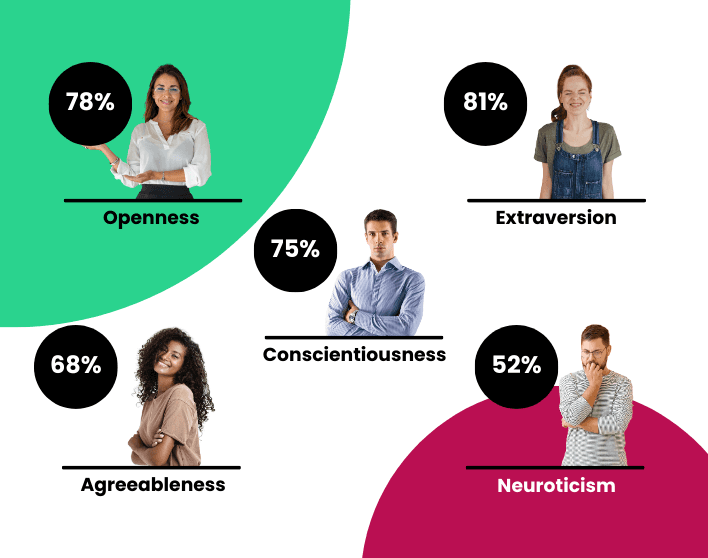The Bryq Team
HR Experts
As a recruiter or hiring manager, we all wish that we could have a crystal ball to see into the future and determine how successful an applicant could be in the available role. Will they be able to tackle tasks head-on? Will they be able to cope with the rapid changes in your industry? One of the best ways to predict candidates’ job performance is with cognitive ability tests completed during the recruitment process.
What Are Cognitive Ability Tests?
Cognitive ability tests are designed to evaluate the respondent’s mental aptitude. Otherwise known as intelligence testing, cognitive ability tests find out how well an individual can plan, reason, and problem solve.
The cognitive ability of any employee has a significant impact on their performance on the job. That’s why many hiring managers choose to test for cognitive ability before offering the role to any candidate.
Candidates who achieve high scores on cognitive ability tests have been found to learn new information faster, be more adaptable to changing environments, and are more likely to finish their training successfully.
By measuring an applicant’s cognitive ability, you can deepen your understanding of how able the person is to:
Understand concepts
Learn from their previous experiences
Think abstractly
Learn and apply new information to situations
Adapt
Problem solve
Research proves that, in comparison with other often-used selection tools for hiring, cognitive ability tests have better predictive validity. This means that they can more accurately predict the level of job performance than other tools.
In the field of HR, we often look to the methods used by Fortune 500 companies to attempt to replicate their success. In this case, around 80% of them use pre-employment testing so that they can find out more about their applicants’ cognitive abilities before hiring them.
Why Cognitive Ability Tests are Such Excellent Predictors of Performance
There are a few reasons why cognitive ability tests are so great at predicting performance in job applicants.

Find Candidates with Excellent Problem-Solving Abilities
In most workplaces and roles, issues will regularly crop up in the course of your everyday work. Having a staff member who is excellent at thinking of alternative solutions and being creative with problem-solving can turn around projects on the brink of disaster.
Those who have more cognitive ability can also solve any problems they encounter not only more effectively but also quicker than others. Many workplaces run to tight deadlines, so the ability to think of solutions quickly is essential.
If you want someone to be able to use their common sense and efficiently deal with unexpected situations, you want someone with excellent problem-solving abilities, particularly for manager-level roles.
Determine Who Is Good at Acquiring New Knowledge
Another reason you may consider adding cognitive ability tests into your hiring process is that these can determine which of the applicants can acquire and implement new knowledge and techniques.
When completing an ability test, the respondent must first understand the information it contains. Then, they can go on to solve the problem or answer the question. A person who scores well on these tests must, by definition, be able to pick up knowledge quickly.
In the workplace, this is a useful skill to possess. Your managers, clients, and stakeholders will continuously be expecting the candidate to listen and understand their needs. Additionally, the person may be good at seeing what is going on in the marketplace and adjusting to changes in the industry very rapidly.
How to Use Cognitive Ability Tests as A Valid Predictor of Job Performance
The question that hiring managers often ask recruitment specialists is whether cognitive ability tests are a valid predictor of on-the-job performance. They want to make sure that any method used in the recruitment process is fully valid and will give them useful information.
Yes, cognitive ability tests can absolutely be a valid predictor of job performance – but only when they are used in the right way. The candidate must be tested on an ability that is highly relevant to the role they are applying for. For example, a data entry role may not require much problem-solving. So, testing candidates on this ability is not a good indicator of performance. However, performing the same test on applicants for a data analyst role may be highly indicative of potential performance.
You must use the correct type of cognitive ability test for the role you are recruiting for, as there is no one-size-fits-all test that you can implement. Instead, think critically about the primary cognitive abilities required for the position in question, and then seek out a test that measures candidates on those factors. This is the best way to increase the validity of the test you use.
How to Use Cognitive Ability Tests in Your Recruitment Process
Incorporating ability testing into your recruitment process is simple. Once you have screened the resumes and cover letters you have received for the position, create a shortlist of applicants. This can be as many as you like, but we recommend choosing more than you usually would put on an interview shortlist, perhaps around 5-8 people. Ask these people to undertake a cognitive ability test.
Once you have the results, you will be able to predict job performance, and you can select your shortlist to interview based on this information.
By adding cognitive ability tests into your hiring procedures, you will gain a more accurate picture of how the applicant would handle the role they are applying for. You can achieve insight into whether they have the skills and abilities required for the role and whether they have the potential to achieve a high level of success in the position. This makes it far easier to make hiring decisions, as you can base them on data and not just your gut feeling. However, it is essential to interview candidates you are considering for the role as well, for things like personality, team fit, and other relevant factors.








